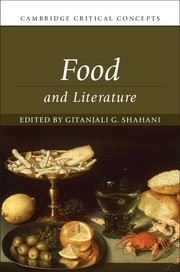Book contents
- Food and Literature
- Cambridge Critical Concepts
- Food and Literature
- Copyright page
- Contents
- Notes on Contributors
- Introduction
- Part I Origins
- Part II Developments
- Chapter 7 Visceral Encounters
- Chapter 8 The Ethics of Eating Together
- Chapter 9 Eating Athwart and Queering Food Writing
- Chapter 10 Utilizing Food Studies with Children’s Literature and Its Scholarship
- Chapter 11 Avant-Garde Food Writing, Modernist Cuisine
- Chapter 12 Comic Books and the Culinary Logic of Late Capitalism
- Part III Applications
- Afterword
- Index
- Cambridge Critical Concepts (continued from page iii)
- References
Chapter 11 - Avant-Garde Food Writing, Modernist Cuisine
from Part II - Developments
Published online by Cambridge University Press: 26 June 2018
- Food and Literature
- Cambridge Critical Concepts
- Food and Literature
- Copyright page
- Contents
- Notes on Contributors
- Introduction
- Part I Origins
- Part II Developments
- Chapter 7 Visceral Encounters
- Chapter 8 The Ethics of Eating Together
- Chapter 9 Eating Athwart and Queering Food Writing
- Chapter 10 Utilizing Food Studies with Children’s Literature and Its Scholarship
- Chapter 11 Avant-Garde Food Writing, Modernist Cuisine
- Chapter 12 Comic Books and the Culinary Logic of Late Capitalism
- Part III Applications
- Afterword
- Index
- Cambridge Critical Concepts (continued from page iii)
- References
Summary
- Type
- Chapter
- Information
- Food and Literature , pp. 220 - 236Publisher: Cambridge University PressPrint publication year: 2018

